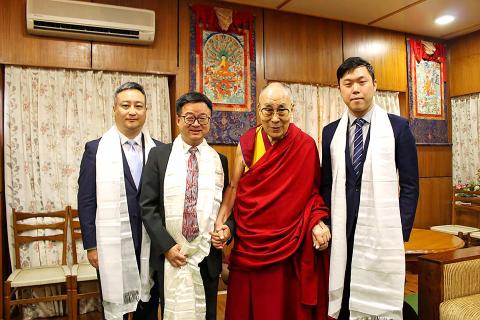Top Democratic Progressive Party (DPP) officials during a visit with the Dalai Lama in Dharamsala, India, vowed to forge closer cooperation with the exiled Tibetan government and to form an international “Silk Road of Democracy” (民主絲路) to fight Chinese oppression.
A direct channel has been established with the Dalai Lama after their fruitful talks from Wednesday to Friday last week, which focused on the strength of Taiwan’s democracy and protests in Hong Kong, DPP Secretary-General Luo Wen-jia (羅文嘉) said yesterday.
Luo was accompanied by party spokesman Lii Wen (李問) and public relations director Hsieh Yu-li (謝雨利) for their meeting with the Dalai Lama and officials from the exiled Tibetan government.

Photo from Lii Wen’s Facebook via CNA
“Taiwan’s main strength lies in its democracy,” Luo quoted the Tibetan spiritual leader as saying.
Although it is threatened by Chinese missiles and other intimidation tactics, “Taiwan’s strongest countermeasures include democracy, freedom and the comprehensive preservation of traditional culture,” Luo added.
Taiwan would build a broad international alliance that brings together Tibetans, Uighurs, Hong Kongers, Inner Mongolians and overseas Chinese democracy advocates to promote freedom, human rights and democratic values in China, Lii said.
The project would be called the “Silk Road of Democracy” to counter China’s Belt and Road Initiative, Lii said.
“The DPP and Tibetans share much of the same values and stand together under the same threatening force. Therefore, we shall forge a network with Tibetans, Uighurs, Hong Kongers and Inner Mongolians to pursue and consolidate democracy,” Luo said.
Asked whether there are plans to invite the Dalai Lama to Taiwan, Luo said that while he was representing the DPP and not the government on the trip, Taiwan is a free nation and the door is always open for people who seek freedom and democracy.
He said that the DPP welcomes the exiled Tibetan leader, who has not visited Taiwan since 2009.
“It is up to the willingness of His Holiness the Dalai Lama,” Luo added. “He has fond memories of his previous trips, but he said that his advanced age is not suitable for taking long flights.”
The DPP entourage also met with other key officials, including exiled Tibetan Prime Minister Lobsang Sangay, Legislative Speaker Pema Jungney, Secretary for Foreign Affairs Sonam Norbu Dagpo and Tibetan Youth Congress president Gonpo Dhondup.
Luo quoted the Dalai Lama as saying that he had not ruled out Taiwan as a location for his reincarnation, since it would take place in a Buddhist country.
Human Rights Network for Tibet and Taiwan president Tashi Tsering conferred hada, traditional Tibetan silk scarfs, on Luo, Lii and DPP Deputy Secretary-General Lin Fei-fan (林飛帆) to thank them for the party’s efforts in helping him obtain Republic of China citizenship.
As an exile, he has never seen his Tibetan homeland and has lived in Taiwan for 21 years, Tashi said.

Taiwan is projected to lose a working-age population of about 6.67 million people in two waves of retirement in the coming years, as the nation confronts accelerating demographic decline and a shortage of younger workers to take their place, the Ministry of the Interior said. Taiwan experienced its largest baby boom between 1958 and 1966, when the population grew by 3.78 million, followed by a second surge of 2.89 million between 1976 and 1982, ministry data showed. In 2023, the first of those baby boom generations — those born in the late 1950s and early 1960s — began to enter retirement, triggering

ECONOMIC BOOST: Should the more than 23 million people eligible for the NT$10,000 handouts spend them the same way as in 2023, GDP could rise 0.5 percent, an official said Universal cash handouts of NT$10,000 (US$330) are to be disbursed late next month at the earliest — including to permanent residents and foreign residents married to Taiwanese — pending legislative approval, the Ministry of Finance said yesterday. The Executive Yuan yesterday approved the Special Act for Strengthening Economic, Social and National Security Resilience in Response to International Circumstances (因應國際情勢強化經濟社會及民生國安韌性特別條例). The NT$550 billion special budget includes NT$236 billion for the cash handouts, plus an additional NT$20 billion set aside as reserve funds, expected to be used to support industries. Handouts might begin one month after the bill is promulgated and would be completed within

NO CHANGE: The TRA makes clear that the US does not consider the status of Taiwan to have been determined by WWII-era documents, a former AIT deputy director said The American Institute in Taiwan’s (AIT) comments that World War-II era documents do not determine Taiwan’s political status accurately conveyed the US’ stance, the US Department of State said. An AIT spokesperson on Saturday said that a Chinese official mischaracterized World War II-era documents as stating that Taiwan was ceded to the China. The remarks from the US’ de facto embassy in Taiwan drew criticism from the Ma Ying-jeou Foundation, whose director said the comments put Taiwan in danger. The Chinese-language United Daily News yesterday reported that a US State Department spokesperson confirmed the AIT’s position. They added that the US would continue to

IMPORTANT BACKER: China seeks to expel US influence from the Indo-Pacific region and supplant Washington as the global leader, MAC Minister Chiu Chui-cheng said China is preparing for war to seize Taiwan, Mainland Affairs Council (MAC) Minister Chiu Chui-cheng (邱垂正) said in Washington on Friday, warning that Taiwan’s fall would trigger a regional “domino effect” endangering US security. In a speech titled “Maintaining the Peaceful and Stable Status Quo Across the Taiwan Strait is in Line with the Shared Interests of Taiwan and the United States,” Chiu said Taiwan’s strategic importance is “closely tied” to US interests. Geopolitically, Taiwan sits in a “core position” in the first island chain — an arc stretching from Japan, through Taiwan and the Philippines, to Borneo, which is shared by